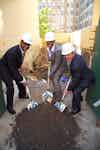Grit and Grace – that is the mantra that characterized Alexis McSween’s life and work for more than 11 years. McSween is the founder and CEO of Bottom Line Construction and Development, a 100% woman-and minority-owned company in New York, where she works to cultivate inclusive, proud communities through the high-quality structures, spaces, and infrastructure her company builds. But McSween does not just build communities, she invests in the people of those communities by hiring them as part of her projects.
McSween also runs a not-for-profit, Youth Construct, which provides NYC youth in underserved communities with access to careers in construction, architecture, engineering, and real estate development. Based in Harlem, they are developing a pipeline of highly qualified construction professionals that are sourced from local high schools in the area.
Her work isn’t going unnoticed. Bottom Line was a 2021 U.S. Chamber of Commerce Dream Big Award Finalist and a 2020 Small Business Administration Award Winner. McSween was named New York Small Business Development Center 2020 Female Entrepreneur of the Year. As of this week, she was also named as part of an initiative that convenes Black women developers who will collectively work to advance and support a shared policy platform to further racial equity and economic opportunity within the real estate sector – a program launched by Enterprise Community Partners with support from Goldman Sachs.
We sat down with McSween to talk about her outlook on her work in underserved communities, the challenges and opportunities her business is facing in 2022, and what business means to her.
What follows has been condensed and lightly edited for clarity.
Q: Tell us a bit about Bottom Line Construction & Development’s mission.
A: I am in business, but it is mission-driven in a way because even though we are a contractor and developer, most of the communities we serve are within the five boroughs and usually are underserved communities. The true mission is to provide more lucrative pathways for the people in those communities than entry-level labor.
Construction and development go past the actual physical structure, it goes into planning, how it impacts the surrounding neighborhood, how people are allowed to be involved and for how long. A lot of people see projects going up in their communities, but they have nothing to do with the final decision of what is going to be there. We just give them a voice. That is our commitment. It is important to develop talent in the same communities where these new multi-million-dollar projects go up.

Q: What opportunities in the business landscape are you most excited about in the coming year?
A: We just were awarded a project at 125th street – the New York Public Library. We are still finishing the Victoria Theatre, which, as of today, is the tallest building in Harlem. And that has a Marriott hotel, 200 apartments with 50% being affordable housing, and a lot of retail and theater spaces. We are also working on a development project RFP (request for proposal) for a church in the Bronx.
We have 23 students in our not-for-profit, Youth Construct. We meet every Monday and Wednesday. This program is helping youths from underserved communities, and I am really hoping that that grows this year. We have a Turner construction company sponsorship and AECOM provides the space and the meals for the kids. We are just thankful that they are as passionate about young people in these communities as we are.

Q: What are some of the challenges your business is facing in the coming year?
A: I would say human capital. Technology is increasing rapidly, so you have people that may be very smart, but they are not as tech-savvy. Construction is transforming into a way more technology-driven field. We are growing and getting to those types of projects, we must have professional development within our firm. You must figure out: how do you make sure everybody else is up to speed so that you can be competitive?
Q: How can the U.S. Chamber do more to support Black business owners and Black entrepreneurship?
A: Policy on bonding insurance. We are getting jobs, but we do not have lines of credit, so the bonding and the guarantees of the bonding are important – if something goes wrong, your whole family is wiped out because you just do not have that type of wealth. In order to play the game, you must have that bond.
Q: We like to ask participants what business means to them. Could you finish this sentence in your own words: “Business is...”
A: Business is how well you can make a lasting impact on the communities that you serve.
For more on Bottom Line Construction and Development, visit them here.
About the author

Kaitlyn Ridel
Kaitlyn Ridel is the former Senior Director of Digital Content at the U.S. Chamber of Commerce.





